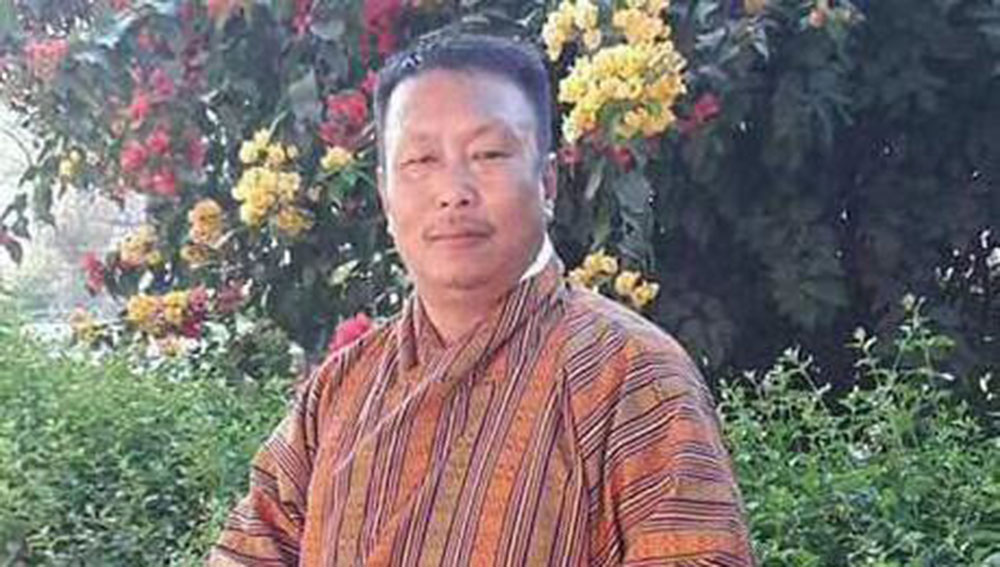Choki Wangmo | Tsirang
Upright, virtuous, and strong: these are the common words used by Mendrelgang voters to describe their new 53-year-old gup, Yeshi.
Originally from Lungyi, Paro, Yeshi was among the first re-settlers in Tsirang. As a local government (LG) leader for more than two decades, he knows the developmental needs in every corner and pocket of the gewog.
Yeshi was first elected as gup in 2001, winning by two tickets over three other contestants.
“Mendrelgang was a thick, forested area then. We walked six hours from Mendrelgang to Damphu to buy essentials,” says the gup, who previously worked as a supervisor for irrigation in the dzongkhag.
In 1997, Damphu had only two shops, he said, one pool vehicle for the dzongkhag administration, and just one car in the whole of Tsirang. Many houses, he remembers, were made of bamboo.
Mendrelgang gewog just had a community school up to Class III, a basic health unit, and a farm road connecting the gewog to Dhopi.
The gewog, now considered among the developed gewogs in Tsirang, has 100 percent drinking water coverage, farm roads connecting all the chiwogs, 70 percent irrigation water coverage, and a central school.
These, the residents said, are the result of efficient and transparent leadership of the gup who has varied experiences of having served under five dzongdags and decade-long experience as a dzongkhag tshogdu thridzin.
Yeshi is a voracious chewer of doma and has a thick Parop accent. He has been efficient in uniting people of 17 dzongkhags (389 households) who have re-settled in the gewog.
It took Yeshi more than a year to bring the people together for developmental work in the gewog. “Re-settlers bring in their own customs and traditions. There were differences. Leaders need to be versatile and broad-minded, and leadership style has to change according to the people and the changing situations.”
In his current tenure, Yeshi plans to continue the work of constructing durable farm roads, focus on proper distribution, and management of drinking water through reservoir tanks.
As the gup, Yeshi believes that the decentralisation of power from the Throne comes with critical responsibilities. “Leaders misuse authority; we have the authority to look after people and their well-being; we cannot pursue selfish goals as elected leaders.”
He said that national security, driklam namzha, and selfless leadership have been his inspiration while leading his gewog forward.
Many LG candidates, he said, were attracted by benefits. “We should be motivated by the trust people have placed in us.”
The gup, who wants to end his LG participation by the end of this tenure, hopes that motivated young people with a drive and wish to develop the gewog will take over the responsibilities.
“Young people do not stay in the chiwogs, but they declare their candidature during elections without knowing the realities in the field. Without experience, they are attracted to monetary benefits,” he said.
If they participate whole-heartedly, there won’t be corruption and weakness in leadership, he added.
Gewog merger
Yeshi said that the human resources and other related costs could be reduced with a gewog merger, but equitable development and service delivery could be compromised, particularly for remote areas.
With the merger, many functionaries such as gewog administration officers, caretakers, drivers, and gewog RNR extension workers, who are currently employed in the LG, he said, would be rendered jobless.
LG needs
Yeshi said that to empower chiwog tshogpas, a tshogpa office is necessary, which will not only hasten service delivery and communication at the grassroots level, but will also help people get required services without having to travel to the gewog administration office.
“The tshogpas are efficient in solving social issues. They should stay in office. To attract capable tshogpas, there is a need for incentives or monetary benefits,” he said.
Two chiwogs in Mendrelgang have a tshogpa office.
Yeshi also said that gewogs require at least two livestock extension officers for effective public service delivery.
National Acts and policies, he said, should align with each other to ensure a transparent working system. By way of example, he said that the LG Act says that the gewog has to monitor those officials working in the gewog, but it hasn’t been implemented yet.


